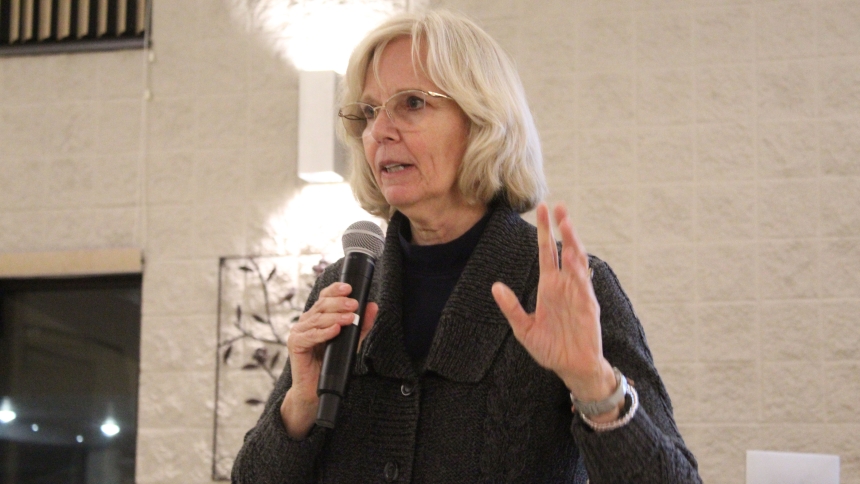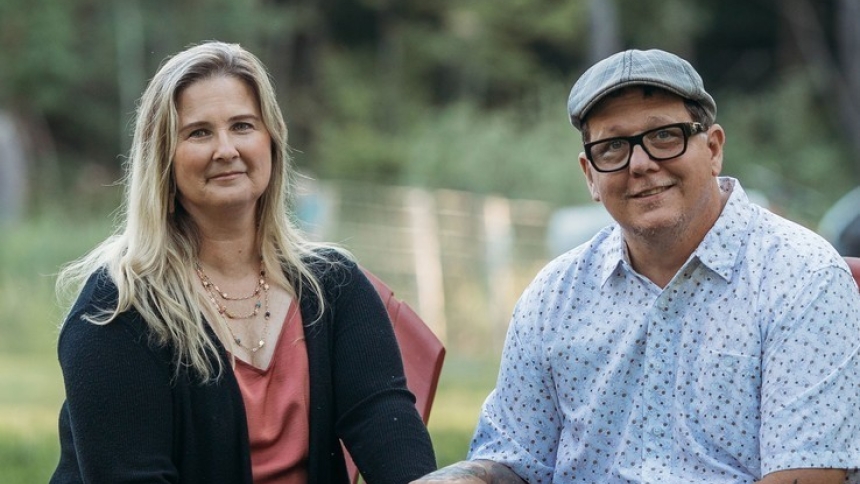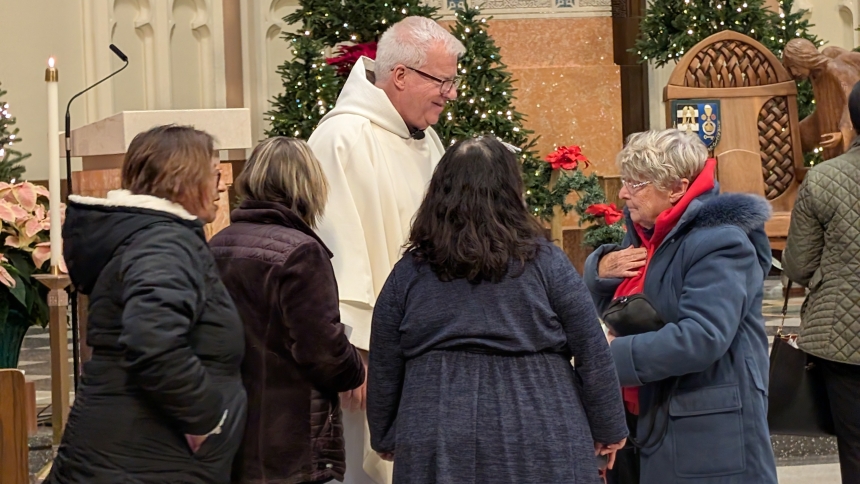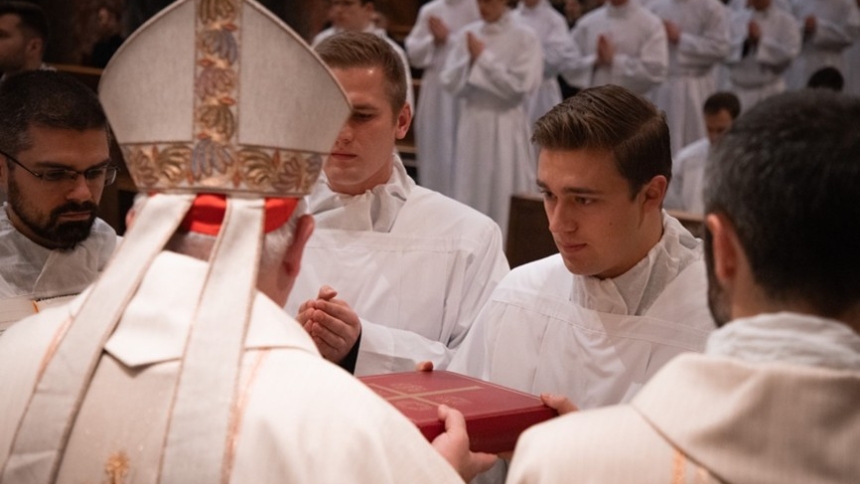
MERRILLVILLE – A scientist by profession, Dr. Julie Peller, chemistry professor and climate researcher at Valparaiso University, nevertheless thinks with her heart as well as her head when she sees the “unprecedented threat of climate change and environmental degradation” identified by Pope Francis in his 2015 encyclical “Laudato Si (On Care for Our Common Home)” reflected in her work.
“I can’t separate my (Catholic) faith from what I do,” she said in opening her presentation on “Church Teaching on Our Responsibility to Care for the Environment,” hosted by Our Lady of Consolation and Holy Martyrs Parish on Jan. 16 at OLC. “I think of my grandchildren. We are leaving our children and grandchildren with a lot of problems and it’s time we start doing something about them.”
For the next hour, Peller educated her audience with scientific facts, figures and photos outlining the wastefulness and disregard humans have shown for the precious natural resources available on Earth, interspersing her information with quotes from Pope Francis and previous prelates urging people to take better care of God’s gifts. She ended her lesson with practical steps achievable by people in everyday life to make a difference and improve the environment for future generations.
The harnessing of fossil fuels (coal, oil and natural gas) by humans led to ever-increasing amounts of carbon dioxide being released into the atmosphere. “It also led to the creation of plastics, pharmaceuticals and other stuff that we throw away after one use,” Peller said. “Massive waste has been created by this materialism and consumerism and when we run out of room (to dispose of it), where do we go?”
Listening to Peller’s message, Deacon Peter Znika, of Hebron, admitted that he has been “pretty oblivious” to the effects of climate change on society. “Yet there are little things we can do that can have a real impact … we can make a financial decision not to purchase some of these things. I think of all the plastic toys my grandchildren have and how we could make an effort to choose more wooden toys, for instance.
“I need to be a better steward, take better care of the environment,” he added. “I looked at that statement about how we are only borrowing the future from our children, and I think instead that we are stealing it.”
Jackie Mitchell, an Our Lady of Consolation parishioner from Merrillville, said curiosity about how to improve the environment drew her to the program. “I was sickened by the pictures of the animals … I’m going to pay more attention to the things I can recycle.”
Having seen first-hand the proliferation of plastic bottles and other debris and its effect on birds and mammals along the Lake Michigan shore, Peller is especially passionate about reducing the use of single-use plastics by replacing them with reusable water bottles, mesh produce bags and recyclable food containers.
While climate change and pollution require a worldwide commitment to change behavior, “the U.S. represents 4% of the world’s population, but produces 12% municipal solid waste,” said Peller. All materials are products of the Earth’s resources, so a linear system is not sustainable.
“We need to think more about a circular economy so we can bring these resources back to use, instead of discarding them,” she noted.
In Laudato Si, she noted, Pope Francis points out that “pollution is closely linked to a throwaway culture,” and urged society to realize that creation is harmed when people “use (our property) for ourselves alone. The misuse of creation begins when we no longer recognize any higher instance than ourselves.”
“How do we view these gifts of nature?” Peller questioned, using the term “integral ecology” to identify that “We are all part of this together.”
Explaining how science was used by Pope Francis in Laudato Si, Peller referred to climate change; massive waste; air, soil and water pollution and the loss of biodiversity as troublesome issues that the pope indicated should be addressed immediately. “Climate change is a global problem with grave implications for the environment, society, economy, politics and for the distribution of goods. The worst impact will likely be felt by developing countries and the poorest people,” he wrote.
“A number of new studies project a death toll of up to five million people yearly” in the near future, said Peller, as carbon dioxide levels showed increases in 2021-22 after an earlier reduction in levels. “My profound sadness is that my grandchildren will never see a beach free of waste and garbage.”
Peller offered some optimism for the future. “We can still make changes and technology is leading the way,” she noted. “We have solar energy, electric cars, and some states are passing legislation to hold plastic producers accountable for their producers. There are research and development investments, and circular economy initiatives like using more recyclable materials.”
As a “call to action,” Peller suggested beginning the conversation with prayer and the motivation of priests and deacons to establish an Environmental Committee in parishes and schools and spread the word about how to reduce pollution and increase recycling through posters, social media and word of mouth. “Make a plan for simple changes in each parish” – eliminate the use of plastic bags and bottles, convert to reusable items, recycle, compost, make wise purchases and convert to renewable sources of energy.
By creating a Ministry for the Environment, parishes could find the leadership to plant a community garden, plant trees, make reusable shopping bags from old T-shirts, collect plastic caps for recycling and host an Earth Day workshop, she suggested. “You could print Lenten commitment cards and encourage parishioners to write down things they will do to improve the environment,” Peller said.
In a closing reflection, Deacon Tom Grzybek, of Holy Martyrs, said, “We have an absolute duty and responsibility to take action” about threats to the environment. “The common good means that we all should look out for each other. The scarcity of resources could be the cause of the next world war.
“The U.S. Catholic Conference of Bishops’ Catholic Social Teaching document notes that we are called to be a family and a community, seeking the well-being of all, especially the poor and vulnerable, (because) each person has a fundamental right to life,” the deacon continued. “We are all called to be part of our faith, or we will become apart from our faith.
“We have a responsibility to care for God’s creation, and we show our respect for that creation by caring for all of His creatures,” he added.
Caption: Dr. Julie Peller, a chemistry professor and environmental researcher at Valparaiso University, presents a program on "Church Teaching on Our Responsibility to Care For the Environment" at her parish, Our Lady of Consolation in Merrillville, on Jan. 16. "I can't separate out my faith from what I do (as a scientist)," she told her audience. "We are leaving our children and grandchildren a lot of problems, and it's time we start doing something about them." (Marlene A. Zloza photo)



